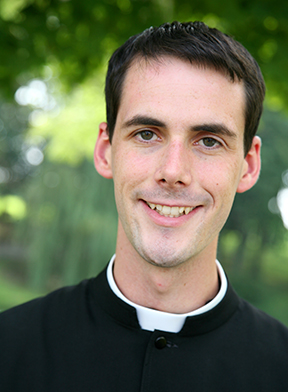When it comes to proclaiming Christ, trust grace and just start doing it

Father Timothy Hepner
Second Sunday of Advent/Dec. 9
Baruch 5:1-3; Psalm 126:1-2,2-3,4-5,6; Philippians 1:4-6,8-11; Luke 3:1-6
“All flesh shall see the salvation of God.” The words of Isaiah reverberated and found their fulfillment in the events of John the Baptist’s proclamation. St. Luke, the painstaking historian, tells us specifically when and where these events occurred. This is important, because salvation doesn’t happen to the abstract concept of “humanity,” but to particular people in particular places, with their own cultures, languages, problems, and gifts.
It could not have been easy for John to set out on his campaign throughout the region of the Jordan, convicting people of sin and telling people forgiveness was at hand. It’s easy for me to write a column for a newspaper about the Gospel, staring at a screen and sitting comfortably in my chair. It’s much harder to look particular people in the face and, like a doctor telling someone they have cancer, diagnose them with the malady of original sin. But that’s precisely what John needed to do if people were going to accept the infallible cure of Jesus Christ.
RECENT CHALLENGES
I’ve been very interested in an international debate regarding John Allen Chau, an American Christian missionary who was killed while trying to evangelize the most isolated group of people in the world, the Sentinelese, who live on an island off the coast of India. Some see Chau as a brave missionary, following Jesus’ mandate to go to the ends of the earth. Others see him as another prideful Western colonizer who risked infecting the Sentinelese with deadly diseases.
Often, in the face of a concrete challenge to evangelize those around us, we grasp for objections and excuses . . . . But we have the grace of Christ which will inspire us and bring this good work to a conclusion.
Another name in the news is Asia Bibi, a Christian Pakistani convicted of “blasphemy” and sentenced to hanging in 2010. Despite violent threats and the assassination of two politicians who defended her, she was acquitted by the Supreme Court of Pakistan, though Western countries are resistant to giving her asylum for fear of violent reprisal.
I can’t give a definitive verdict on John Allen Chau, and I can’t begin to understand why Asia Bibi’s fellow Pakistani citizens are so thirsty for her death. But I do know that they are both real people in real places, living in our time, who re-echoed the words of Isaiah with their lives: “All flesh shall see the salvation of God.” These people are both a fascination and a challenge to me. Their persistence and suffering seem to ask, “Do you really believe in a Catholic Church — one that all people are called to? Do you really believe that salvation comes only through Christ? If you do, what are you doing about it?”
WE’RE NOT ALONE
Often, in the face of a concrete challenge to evangelize those around us, we grasp for objections and excuses: I don’t know how to evangelize. I don’t want to impose on others. I’m not perfect myself. I don’t want to come across as “too Protestant” or “too preachy.” I think, at the heart of it, we’re simply afraid. We’re afraid to single ourselves out, afraid of being rejected by our friends and family, and afraid of being alone.
But St. Paul assures us we’re not alone. He wrote to the Philippians of their “partnership for the gospel,” saying, “I am confident of this, that the one who began a good work in you will continue to complete it until the day of Christ Jesus.”
We are partners in preaching the Gospel. We have the teachings of the Church, the support of our community, the encouragement of bishops and popes. We have more resources available than any other generation of Christians. But, most importantly, we have the grace of Christ which will inspire us and bring this good work to a conclusion.
I vaguely remember riding my first bike without training wheels. It’s a scary thing, but it soon becomes exhilarating. I’m grateful for those who taught me how to ride it, but at some point I had to just get on and pedal. And, like John the Baptist, that’s what we have to do with proclaiming Christ in our own time and place. Just start doing it. And hear the words of Jesus, “I am with you always, until the end of the age.”
—
Father Timothy Hepner is vocation director of recruitment for the Diocese of Peoria. To learn more about vocations, go to comeandfollowme.org or follow the Office of Priestly Vocations at facebook.com/followmepeoria.





